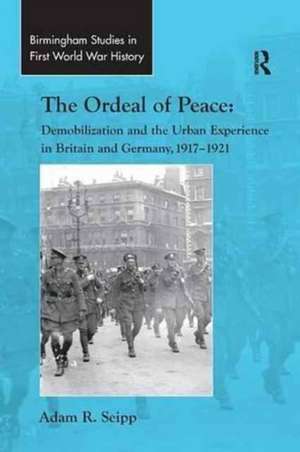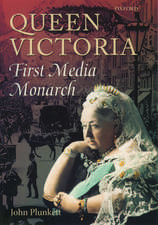The Ordeal of Peace: Demobilization and the Urban Experience in Britain and Germany, 1917–1921: Routledge Studies in First World War History
Autor Adam R. Seippen Limba Engleză Paperback – 15 noi 2016
| Toate formatele și edițiile | Preț | Express |
|---|---|---|
| Paperback (1) | 469.34 lei 6-8 săpt. | |
| Taylor & Francis – 15 noi 2016 | 469.34 lei 6-8 săpt. | |
| Hardback (1) | 1060.11 lei 6-8 săpt. | |
| Taylor & Francis – 28 apr 2009 | 1060.11 lei 6-8 săpt. |
Din seria Routledge Studies in First World War History
-
 Preț: 316.13 lei
Preț: 316.13 lei -
 Preț: 310.36 lei
Preț: 310.36 lei -
 Preț: 330.34 lei
Preț: 330.34 lei - 18%
 Preț: 836.89 lei
Preț: 836.89 lei -
 Preț: 489.26 lei
Preț: 489.26 lei - 21%
 Preț: 255.40 lei
Preț: 255.40 lei -
 Preț: 390.63 lei
Preț: 390.63 lei - 17%
 Preț: 259.98 lei
Preț: 259.98 lei - 18%
 Preț: 995.58 lei
Preț: 995.58 lei -
 Preț: 384.70 lei
Preț: 384.70 lei -
 Preț: 491.17 lei
Preț: 491.17 lei -
 Preț: 416.63 lei
Preț: 416.63 lei - 18%
 Preț: 1056.80 lei
Preț: 1056.80 lei - 18%
 Preț: 998.71 lei
Preț: 998.71 lei -
 Preț: 469.34 lei
Preț: 469.34 lei -
 Preț: 386.39 lei
Preț: 386.39 lei -
 Preț: 469.34 lei
Preț: 469.34 lei - 15%
 Preț: 305.52 lei
Preț: 305.52 lei -
 Preț: 469.34 lei
Preț: 469.34 lei - 12%
 Preț: 299.52 lei
Preț: 299.52 lei -
 Preț: 384.86 lei
Preț: 384.86 lei - 25%
 Preț: 824.80 lei
Preț: 824.80 lei - 18%
 Preț: 1059.93 lei
Preț: 1059.93 lei - 18%
 Preț: 1000.27 lei
Preț: 1000.27 lei -
 Preț: 489.26 lei
Preț: 489.26 lei - 18%
 Preț: 1110.47 lei
Preț: 1110.47 lei -
 Preț: 489.26 lei
Preț: 489.26 lei - 18%
 Preț: 1000.30 lei
Preț: 1000.30 lei - 21%
 Preț: 256.32 lei
Preț: 256.32 lei - 21%
 Preț: 216.07 lei
Preț: 216.07 lei - 26%
 Preț: 820.32 lei
Preț: 820.32 lei
Preț: 469.34 lei
Nou
Puncte Express: 704
Preț estimativ în valută:
89.82€ • 97.53$ • 75.45£
89.82€ • 97.53$ • 75.45£
Carte tipărită la comandă
Livrare economică 22 aprilie-06 mai
Preluare comenzi: 021 569.72.76
Specificații
ISBN-13: 9781138265943
ISBN-10: 1138265942
Pagini: 308
Dimensiuni: 156 x 234 mm
Greutate: 0.45 kg
Ediția:1
Editura: Taylor & Francis
Colecția Routledge
Seria Routledge Studies in First World War History
Locul publicării:Oxford, United Kingdom
ISBN-10: 1138265942
Pagini: 308
Dimensiuni: 156 x 234 mm
Greutate: 0.45 kg
Ediția:1
Editura: Taylor & Francis
Colecția Routledge
Seria Routledge Studies in First World War History
Locul publicării:Oxford, United Kingdom
Cuprins
Contents: Introduction: Munich, Manchester, and the demobilization of Europe. 1917-1921; Manchester. Munich, and urban Europe in 1914. Section I Visions of the End: 1917-18 and the Beginnings of Demobilization: 'Do something!': Manchester in transition and war, 1917-18; An immeasurable sacrifice of blood and treasure: Munich at war, 1917-18. Section II 'The Man Afterwards Changed Completely': Demobilizations, Homecomings, and Transformations: 'The fabric of Europe and the world was being remade': the Armistice and after in Manchester; 'We don't want gratitude, we want our rights': demobilization, violence, and politics in Munich, 1919. Section III 'The Dregs of this Bitter Chalice': Crisis and the End of Demobilization, 1920-1921: 'Ordeal by peace': Manchester 1920-21; Scapegoats for a lost war; the crisis of demobilization in Munich, 1920-21; Conclusion: ending and beginning again; Bibliography; Index.
Notă biografică
Adam R. Seipp is an Assistant Professor of History at Texas A&M University, USA
Recenzii
’The Ordeal of Peace is a monument to careful scholarship... Seipp has produced an admirable work that not only broadens our understanding of demobilization, but also shows the promising possibilities for transnational comparisons of urban experiences in war or peace.’ Urban History 'This book is thoroughly researched and makes use of a wide variety of archival and published sources... Seipp’s perspective on the ways that wartime institutions and cultures influenced the post-war years is a welcome addition to the field of First World War studies and deserves a wide readership.' European History Quarterly
Descriere
Taking a transnational perspective on demobilization this study demonstrates that the experience of mass industrial war generated remarkably similar pressures within both the defeated and victorious countries. Using as examples the important provincial centres of Munich and Manchester, it examines the experiences of European urban-dwellers from the last year of the war until the early 1920s, showing how peace could bring unexpected difficulties to economies and societies that had rapidly and fully adapted to the demands of industrial world war.













